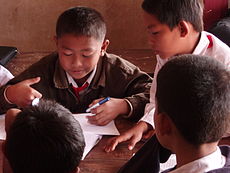Visit and Join the WeHeal ADHD Community
For more information, see: NIH | WebMD | Wikipedia

Attention deficit-hyperactivity disorder (ADHD) is a neurobehavioral disorder that affects 3-5 percent of all American children. It interferes with a person’s ability to stay on a task and to exercise age-appropriate inhibition (cognitive alone or both cognitive and behavioral). Some of the warning signs of ADHD include failure to listen to instructions, inability to organize oneself and school work, fidgeting with hands and feet, talking too much, leaving projects, chores and homework unfinished, and having trouble paying attention to and responding to details. There are several types of ADHD: a predominantly inattentive subtype, a predominantly hyperactive-impulsive subtype, and a combined subtype. ADHD is usually diagnosed in childhood, although the condition can continue into the adult years.
The usual course of treatment may include medications such as methylphenidate (Ritalin) or dextroamphetamine (Dexedrine), which are stimulants that decrease impulsivity and hyperactivity and increase attention. Most experts agree that treatment for ADHD should address multiple aspects of the individual’s functioning and should not be limited to the use of medications alone. Treatment should include structured classroom management, parent education (to address discipline and limit-setting), and tutoring and/or behavioral therapy for the child.
There is no “cure” for ADHD. Children with the disorder seldom outgrow it; however, some may find adaptive ways to accommodate the ADHD as they mature.
Several components of the NIH support research on developmental disorders such as ADHD. Research programs of the NINDS, the National Institute of Mental Health (NIMH), and the National Institute of Child Health and Human Development (NICHD) seek to address unanswered questions about the causes of ADHD, as well as to improve diagnosis and treatment.
CHADD – Children and Adults with Attention-Deficit/Hyperactivity Disorder
4601 Presidents Drive
Suite 300
Lanham, MD 20706
ruth_hughes@chadd.org
http://www.chadd.org External link
Tel: 301-306-7070 800-233-4050
Fax: 301-306-7090
Attention Deficit Disorder Association (ADDA)
P.O. Box 7557
Wilmington, DE 19083-9997
info@add.org
http://www.add.org External link
Tel: 800-939-1019
Fax: 800-939-1019
Learning Disabilities Association of America
4156 Library Road
Suite 1
Pittsburgh, PA 15234-1349
info@ldaamerica.org
http://www.ldaamerica.org External link
Tel: 412-341-1515
Fax: 412-344-0224
National Center for Learning Disabilities
32 Laight Street
Second Floor
New York, NY 10013
ncld@ncld.org
http://www.ld.org External link
Tel: 212-545-7510 888-575-7373
Fax: 212-545-9665
Related NINDS Publications and Information
Methylphenidate and Clonidine Help Children With ADHD and Tics
April 2002 news summary on a clinical trial of methylphenidate and clonidine in children with ADHD and tics.
Visit and Join the WeHeal ADHD Community
For more information, see: NIH | WebMD | Wikipedia
WeHeal is very grateful to our valued sources of information which include Wikipedia, WebMD, ClinicalTrials.gov, Cancer.gov, Infoplease, and the US CDC (Center for Disease Control).